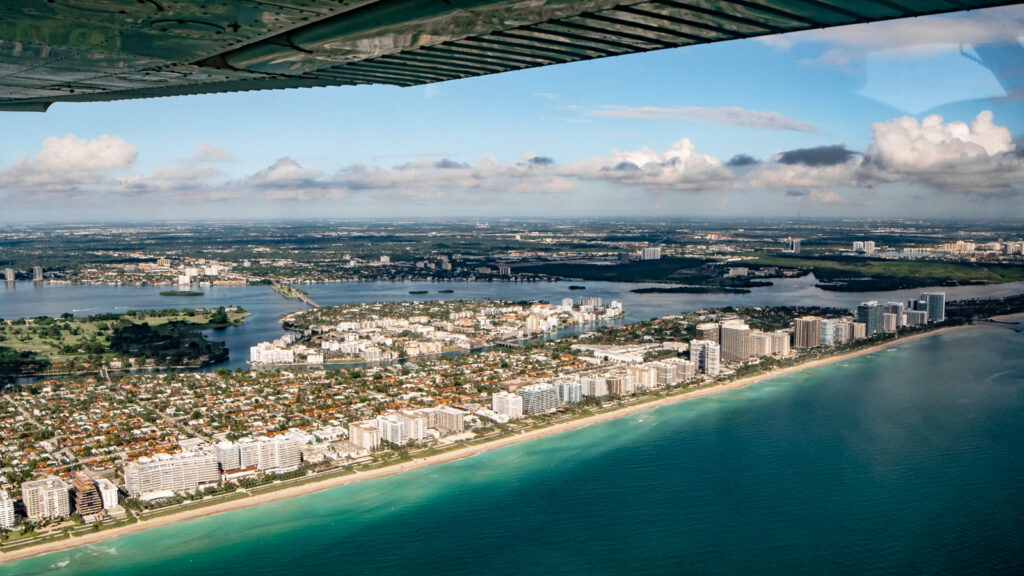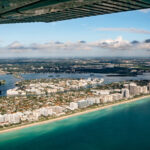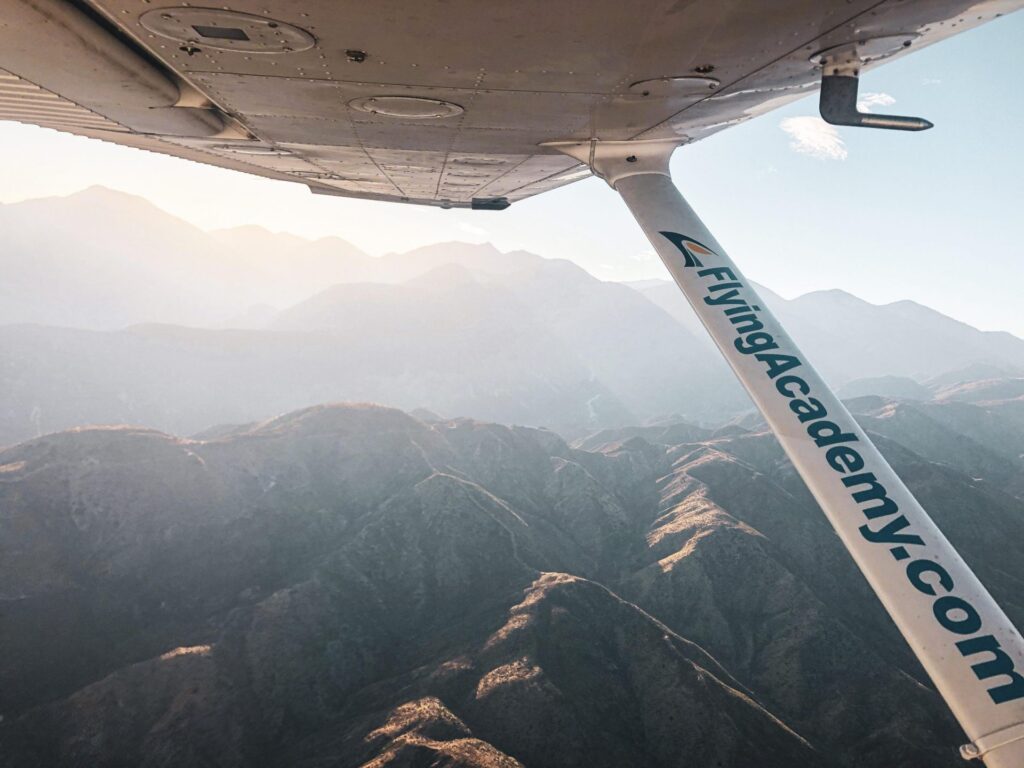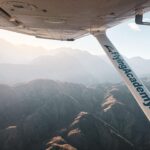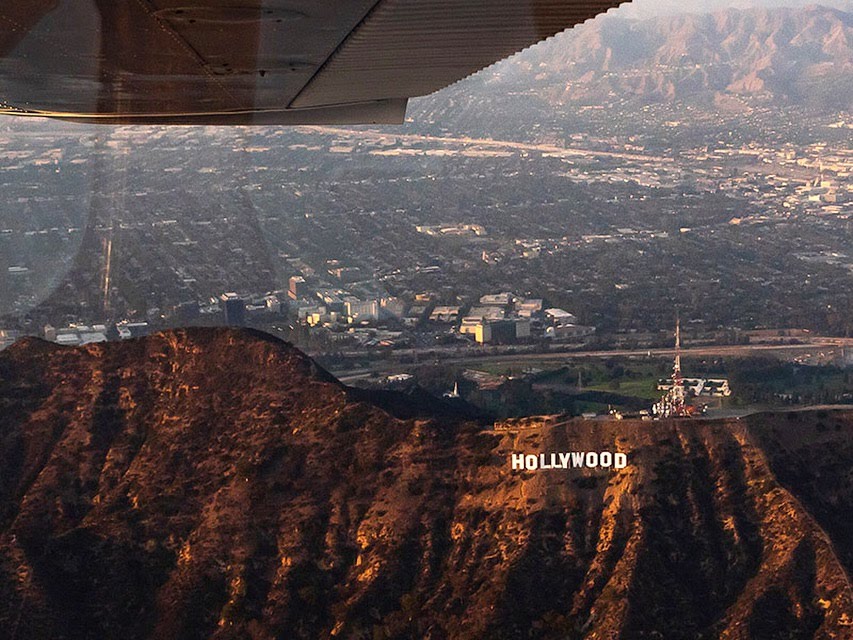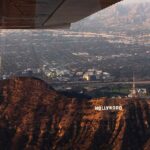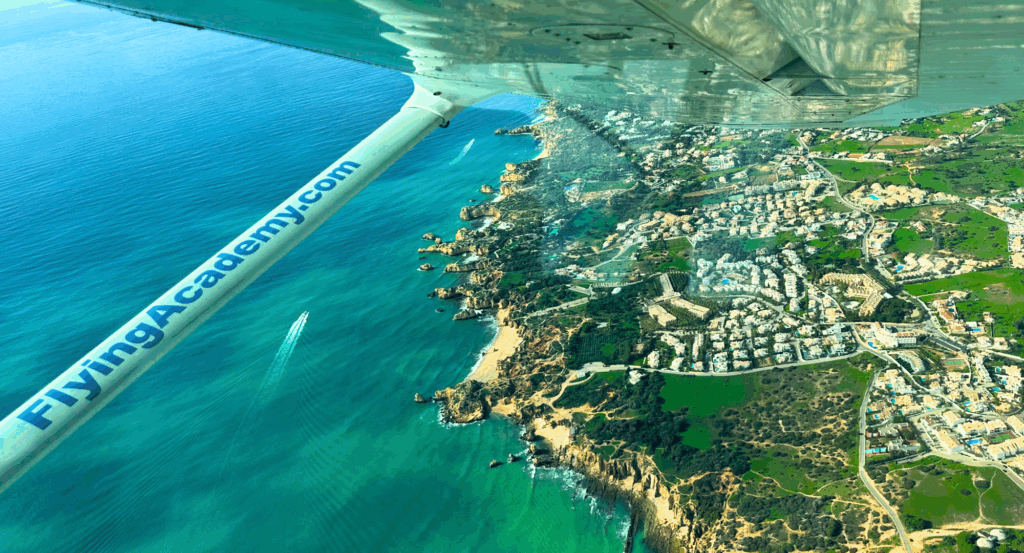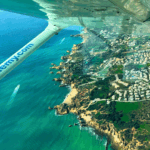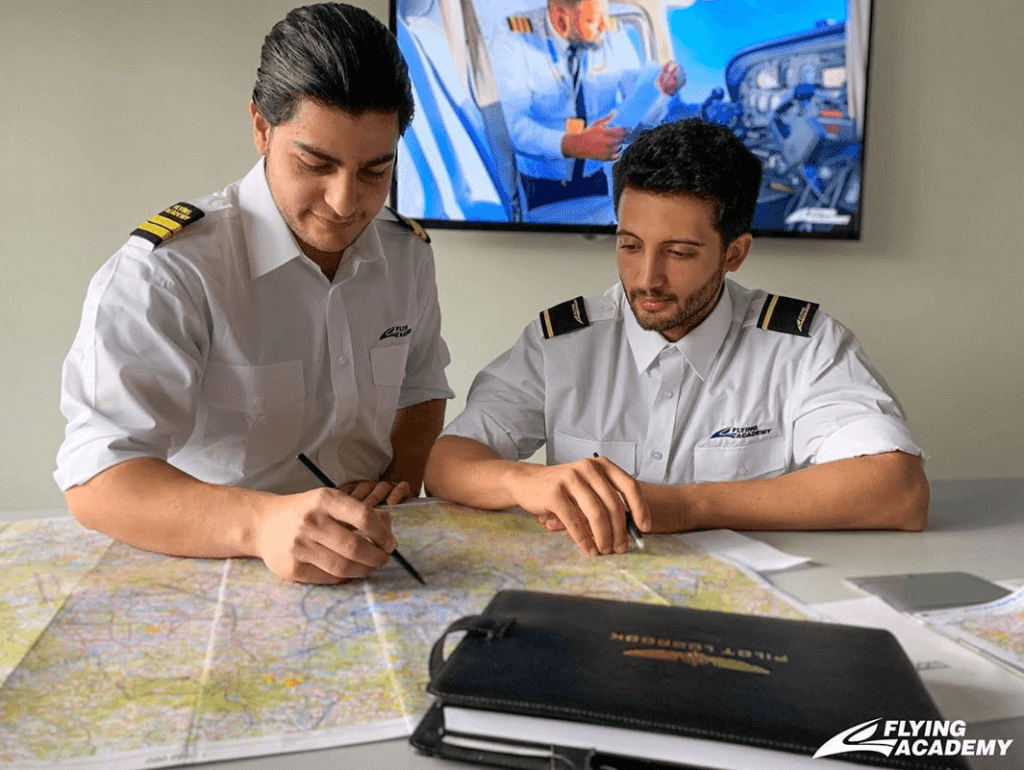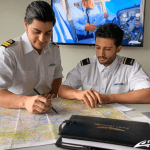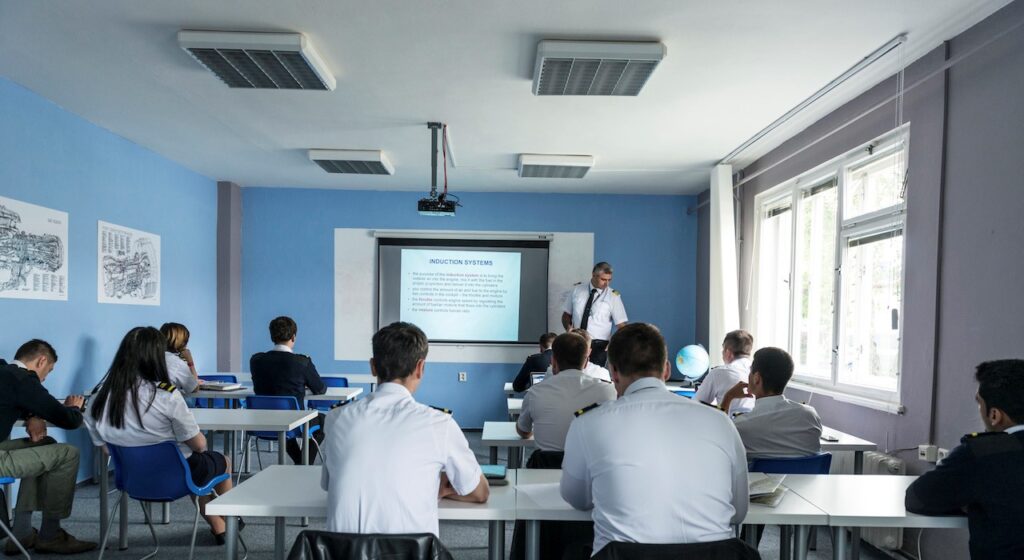EASA Integrated ATPL (A)
- ALL INCLUSIVE PACKAGE -
Join classes starting on 15th September 2025!
Program Fees: 65,900 EUR (not incl. VAT)
-LIMITED SEATS-
Integrated ATPL (A) Course
During the Integrated EASA ATPL(A), you will become a Commercial Pilot in 14 months of intensive preparation, from no flight experience to holding an EASA Multi-Engine, Instrument Rating, Commercial Pilot License with ATPL frozen, including Multi-Crew Cooperation. The Integrated EASA ATPL is a full-time study program with a fixed schedule conducted in a small group. Privileges of the obtained license are to act as a pilot-in-command (Captain) or co-pilot (First Officer) on aircraft engaged in commercial air transportation.
Where can I do my Training?
Prague – Czech Republic
Live in the Heart of Europe: Train in a central, well-connected hub, offering a strategic advantage for your aviation career.
Affordable Living: Enjoy high quality of life with significantly lower costs compared to other European cities.
Vibrant International Hub: Experience yourself in a diverse, welcoming city with an international student community and great networking opportunities.
Rich Cultural Experience: Discover Prague’s stunning history and lively scene, making your pilot training journey truly unforgettable.
EASA Advantage: Gain your widely recognized EASA license in a streamlined process, opening doors to airlines across Europe.
What's Included in the ALL-INCLUSIVE Package?
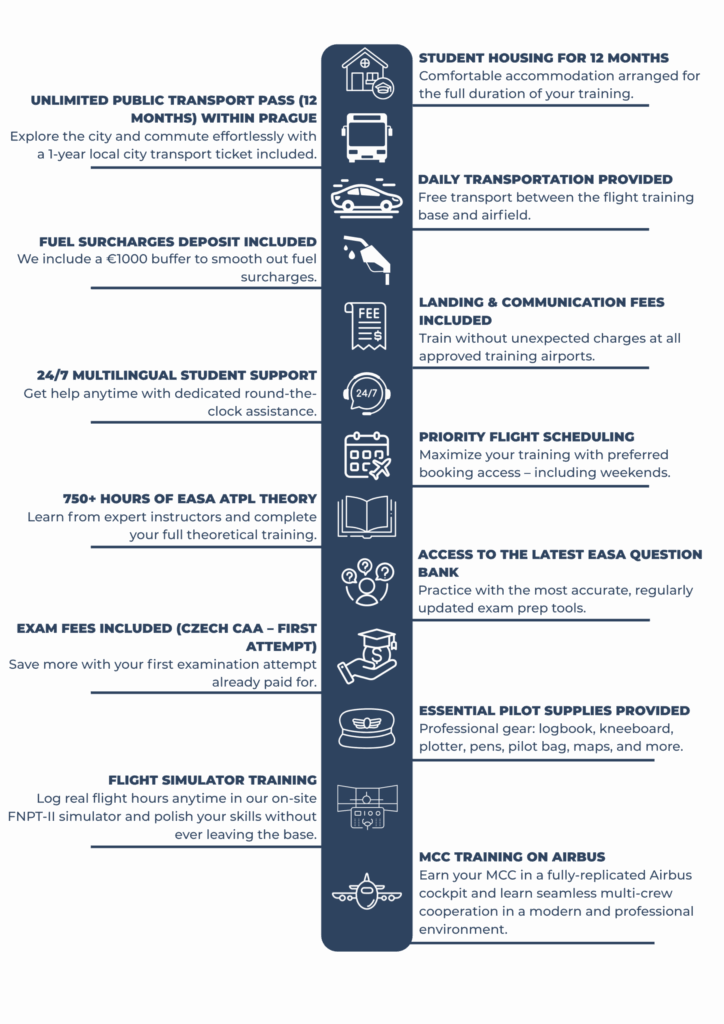
Integrated ATPL (A) Ground Training
The ground preparation consists of 750 hours of theory delivered by our professional lecturers. During the training, from the 14 ATPL subjects, you will have 13 ATPL theory exams, that you must pass to prove a sufficient level of knowledge appropriate to the privileges of the holder of an ATPL(A) in accordance with the EASA Part FCL requirements. The exams will be conducted at the Civil Aviation Authority and will be scheduled by Flying Academy.
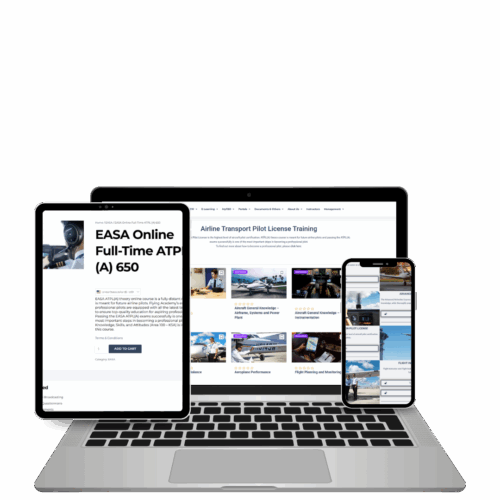
Integrated ATPL (A) Flight Training
The Integrated ATPL course is divided into 6 phases of training:
At the end of the program, the trainee will have flown: at least 198 hours out of which, at least 126.5 hours Dual (with FI), at least 116 hours under IFR, at least 55 hours SPIC, at least 55 hours on the simulator, and at least 16.5 hours PIC.
Get the strong foundation prior to the first solo flight. Develop the knowledge, skills, and habit patterns needed for a solo flight, including the basic maneuvers, airport operations, emergency procedures, and ground reference maneuvers.
Areas covered include:
Dual VFR
VFR Solo
ICAO preparation + language check
RT exam
Briefing/Debriefing
Develop your skills from the previous Phase with advanced maneuvers and practice cross-country flying.
Areas covered include:
Dual VFR
Dual IR (FNPT II Simulator)
PIC Solo VFR Cross-Country
Briefing/Debriefing
Practice night flying and get proficiency, experience and confidence in cross-country operations.
Areas covered include:
Dual VFR Night
SPIC VFR Cross-Country
PIC Solo VFR Cross-Country
Dual Progress Test
Briefing/Debriefing
During this stage you will also complete your theoretical preparation for ATPL exams – 350 hours and pass the rest of the exams at the Civil Aviation Authority.
Areas covered include:
FNPT II Dual IR
Dual IR
SPIC IR
Dual VFR Night
PIC Solo VFR Night
MEP Dual VFR
MEP Dual IR
Briefing/Debriefing
Understand how to cope with the psychological and physiological aspects of dynamic upsets in airplanes and develop strategies to mitigate those effects.
Areas covered include:
Dual Day-VFR
Briefing/Debriefing
Get familiar with processes and procedures in a multi-pilot cockpit during MCC. MCC will make you feel more comfortable in the airliner cockpit and therefore give you a competitive advantage for an airline assessment. You can choose to do your training on the Airbus 320 or the FPS Boeing 737NG.
You have additional MCC training options in this phase.
You can request for:
APS MCC – Airline Pilot Standard Multi-Crew Cooperation:
Airbus 320 OR FPS Boeing 737NG
Requirements
17 years old minimum
The pilot must be at least 17 years to enroll and 18 years of age to be able to get a Commercial Pilot License.
Hold Class 1 Medical Certificate
You need to be physically fit for commercial flying (capable of holding EASA Pilot Medical Certificate Class 1)
Qualifications
You need to be able to read, write, understand and speak English fluently and have basic Math & Physics knowledge.
Student Services
Our student services include visa support and comfortable accommodation options. We’ll provide you with the necessary documents so you can manage your application with ease, and ensure that your home away from home is welcoming and in a supportive environment. With our Student Services, you can pursue your dreams with confidence and peace of mind.
Why Choose Flying Academy
Access Innovative Learning Management System
Broad International Community
Top of the Line Fleet
Experienced & Talented instructors
Located in USA & Europe
State of the Art Virtual Classrooms
Complete ground training from the comfort of your home
Interactive Coursework, Stage Checks, and Monitored Progress
Dedicated flight training consultant & customer support 24/7
Frequently Asked Questions
General
Flying Academy is a flight school authorized by the FAA (Federal Aviation Administration) as well as the EASA (European Aviation Safety Agency).
Flying Academy is:
- EASA Approved Training Organization (CZ/ATO-014)
- FAA Approved 141 & 61 Flight School
Flying Academy is located in the Czech Republic with bases in Prague – the capital, Brno – second biggest city in the country. We also have an additional base in the beautiful city of Portimao, Portugal.
In United States of America Flying Academy is located in Miami, Florida and Los Angeles, California.
Flying Academy has recently opened an office in Gurugram, Delhi NCR, Republic of India to provide you the best consultancy services and assistance with admission process into your dream pilot training program either in Europe or the USA.
To start your training you will need the right visa (if a visa is needed), health or travel insurance, proof of identity and diploma or certificate of your highest education. We will also schedule you for the Medical examination as soon as possible so that you’ll be able to fly solo.
You can start your training as soon as you have all the needed documents.
The regulation in the European Union is very strict about aviation safety. Our fleet is maintained at the highest levels of safety.
Flying Academy is operating a fleet of 31 aircraft. Mainly we are using Pipers and Cessnas for ab-initio pilot training, as these aircraft gained the title of the best aircraft for pilot training.
Flying Academy is a well known provider of ab-initio flight training both in the USA and in Europe. Wide portfolio of courses, allows us to offer tailor-made solutions on top of tried and tested training paths to meet each trainee’s individual needs and help every pilot to reach their goals no matter if you have previous experience in Aviation field or not.
Flying Academy is International Flight Training Center that creates a multicultural learning environment. With students from all around the world. This intercultural competency will help students feel comfortable working in different countries throughout their career or sharing the cockpit of an airline with a pilot from another culture.
Flying Academy is having a whole team of dedicated Flight Training Consultants, located on 2 continents that will guide you throughout all the application process. From your creating a tailor-made training program to arranging your arrival to the school.
Flying Academy is a commercial organization and not providing any scholarships or other form of financial support at the moment. In case you already applied for any funding program and you need a supportive documentation from Flying Academy (confirmation of interest or official training course description with fees) – we will be happy to assist you. Just send the email to [email protected] and your Personal Flight Training Consultant will get in touch with you within 1 business day in order to help with this query. We can however provide you with the contact for Financial Assistance.
Medical Certificates
EASA Medical Certificate
Class 1: 12 months until the age of 40 (depending on the type of flying being performed)
Class 2:
60 months until you are 40
24 months if you are between 40 and 50
12 months if you are over 50
The Class 1 medical examination in Prague takes 2 days, is generally considered more thorough and includes also psychological assessment (several different cognitive and aptitude tests).
The Class 1 medical examination in Vienna takes 1 day and includes very brief psychological assessment.
If you are a Czech or Slovak going for a medical examination in Prague (both Class 1 and 2), you need to bring a report of your medical records from your general practitioner.
If you are a female going for a medical examination in Prague (both Class 1 and 2), you need to bring a report from a gynecologist.
Your Medical Certificate needs to be issued by EASA – an approved medical examiner. The entrance examination for Medical Certificate Class 1 can only be done in an EASA member country (in Europe).
We cooperate with aero-medical centers in Prague or Vienna. If you would like to complete your medical examination in any other EASA-approved medical center, you can do so. However, your Medical Certificate needs to reflect that your Pilot License will be issued in the Czech Republic.
In Prague, the medical examination takes 2 days and can be started either on Mondays or Wednesdays.
In Vienna, the medical examination takes 1 day and can be done on Tuesdays.
The Class 1 medical examination starts early in the morning and lasts the whole day.
We can help you book your medical examination, but the booking should be done approximately 1 month in advance to ensure that your required date will be available.

